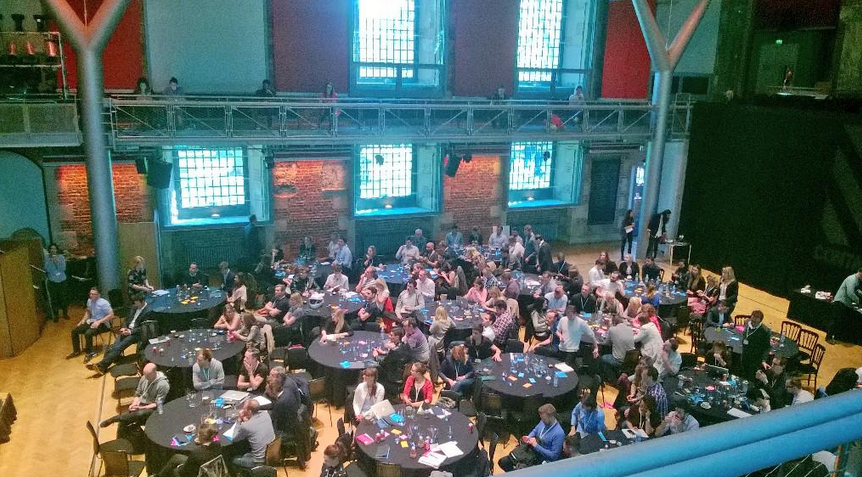Now/Next/Why: What We Learned at Contagious' Most Recent Event
On Tuesday, members of the FleishmanHillard team, and an array of client guests attended the Contagious: Now / Next / Why event at LSO St Luke’s in Shoreditch. The programme promised to look at how new technology is affecting marketing practices, and to give advice to ensure that the brands we all work for are equipped for survival in this rapidly changing industry.

Busy tables at Contagious’ April Now/Next/Why event.
So, what did we learn about making our clients’ brands future-proof?
Millennials value experiences more than physical things
Research shows that millennials derive a much greater enjoyment from spending their money on experiences, rather than physical objects. 78% of them choose to do so (source – EventBrite). Millennials enjoy experiences even more when they can talk about them, with 60% choosing to share those experiences on social media.
In order to cater to this emerging trend, brands traditionally used to promoting products must start to build experiences around the things that they are selling. Dog food brand Pedigree was brought to our attention as a (somewhat unlikely) success story. The key to Pedigree’s success has been the brand’s ability to clearly define its raison d’etre.
Everything that Pedigree does is “for the love of dogs”. From this core proposition, two uniquely engaging experiences have followed seamlessly:
- ‘Doggleganger’, launched a few years ago, used face-recognition technology to match people with their perfect rescue dog. The idea was charming and very socially ‘shareable’, but also clearly demonstrated how the brand lives up to its motto and pours energy into re-housing dogs in need.
- The ‘Tracks’ app invites owners to input their dog’s age and breed. In return, the app tells them how much food and exercise their dog needs to stay healthy. Not only is the user provided with a genuinely useful app but, once again, Pedigree fulfills its motto by helping people become better, more responsible dog owners.
Personal interaction remains at the heart of good experiences
Insights presented at Now / Next / Why tended towards the millennial age group, which prompted the obvious question from the audience: “what about everyone else?”. How, for example, do brands use technology to create experiences for their elderly customers, perhaps not as tech-savvy as their grand children?
The answer given by speaker Will Sanson, is that we’re forgetting two crucial things:
- a truly great experience is one that is shared, and ‘shareable’
- technology is a means to an end, not an end itself
Put those two things together, and a brand’s use of technology becomes clear: help connect people.
Sanson reminisced over his recent successful experimentation with Uber’s Spotify partnership. To his surprise and delight, the song he’d been listening to at home was playing in the cab he climbed into. The pleasure he took from that moment, however, was ultimately due to the shared delight he felt with the cab driver – who was chuffed he’d managed to pull the trick off – rather than the mere fact of matching music. We are a sociable species – to be enjoyed, experiences must be shared.
It’s all about expectation
Have you ever experienced momentary disgust when first eating something you expected to taste radically different? It’s the same with brands: if a customer’s expectation of an experience doesn’t match or, more importantly, exceeds the experience they receive, this can cause immeasurable damage. Careless or dishonest marketing can create unrealistic expectations of a brand experience.
Wagamama wasn’t mentioned at Now / Next / Why – but it’s an obvious example of a brand that properly manages its customers’ expectations through marketing.
When you eat in a group at Wagamama, everyone’s food comes at different times.
In any other restaurant, this would cause considerable annoyance – but not at Wagamama. This is because we are told, through the whole contemporary spectrum of ways in which brands reach consumers (from social media, to radio ads), that the food comes when it’s ready. Not only is this communicated, but it’s actually positioned as a USP: “we don’t expect you to wait for others before you start!” their website tells us.
Consumers don’t like surprises. When brands create experiences around their products and services, they must make sure they are aligned to expectations in order to maintain credibility.
All in all, considerable food for thought for both the FleishmanHillard team and our guests. The event set us all a challenge that we will, no doubt, endeavour to achieve in the coming months and years: helping brands create positive experiences around their products, that bring people together, and match expectations.
Find Out More
-
Achieving Outsized Impact by Building Stronger Country Reputation
February 18, 2025


